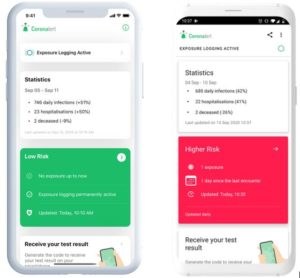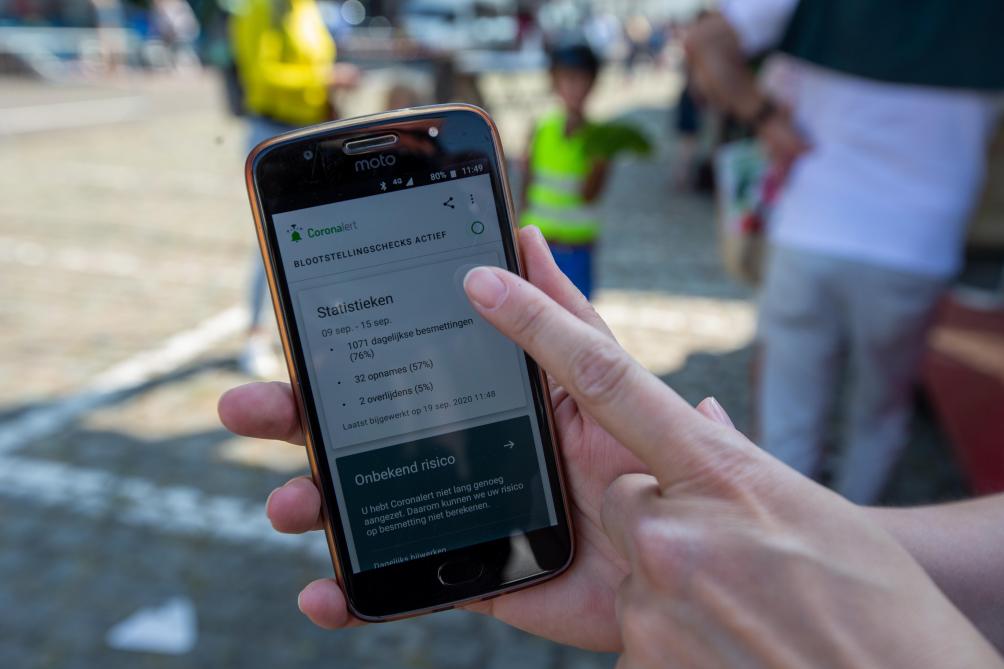Belgium has launched Coronalert, a smartphone app that can be downloaded from today and has to help slow down the spread of the coronavirus in the country.
"By using the app, we can protect each other, slow down the spread of Covid-19 and help contact tracing," said Karine Moykens, chair of the interfederal committee for Testing & Tracing, when presenting the app during a press conference on Wednesday.
"However, the app will only be effective if enough people install and use it," she said, calling on everyone to download the app to their smartphone and to turn it on.
The most important benefit of the app is that it can also notify the people you have been in contact with but do not remember, or those you do not know, and therefore cannot pass on to the contact tracers, according to Moykens.
"The people you meet on public transport or in the supermarket, at a cultural gathering or sporting event," she said. "This way, you can also protect them, provided, of course, that they also use the app."
Related News
- Belgium insists on teleworking where possible
- More than 10,000 coronavirus deaths recorded in Belgium
- Sick, quarantined, tested: which Belgians have been hit by the coronavirus?
Additionally, the app "does not know who you are, or the identity of the people you come into contact with," Moykens stressed. The app only exchanges random codes with the apps of other people who have been close to you, via Bluetooth.
This means that it is not sufficient to simply download the app, the Bluetooth of your device also has to be turned on, so that the codes can be exchanged.
These codes are then stored locally on your smartphone, and automatically deleted after 14 days. "No further data will be exchanged," Moykens said.
If you test positive for the virus and the result appears in the app, you can decide if you want to inform your contacts of your result, anonymously.
"We, of course, do ask you to please do that, so that enough people are informed of a potentially risky contact," Moykens said, adding that the user can then remove the result.
The other app users will not know who informed them (in other words: who is infected), nor do they know where the infection took place. "Only the date of contact is communicated, which is obviously important to know the period of possible infection, and thus not to let the quarantine last longer than the 7 days since the contact took place," she said.
The app works with green and red screens. If you have not come into contact with an infected person, your 'risk status' will be low, and the screen will remain green.
"If you have come into contact with someone who tested positive for Covid-19, and passes this on via the app, you will see a red screen with an 'increased risk status'," Moykens said, adding that you will then receive further instructions via the app.

Credit: Coronalert
In case you have symptoms, the app will advise you to contact your general practitioner. "Tell them that you have symptoms, and let your doctor know that you are using Coronalert. Give them the 17-digit code of your app."
If you have no symptoms, the app will advise you to contact the contact centre. "The centre, in turn, will give you an activation code to get tested at a centre. Via our website, you can then register this code together with the code of your app," Moykens said.
She stressed that there is no need to panic when you get a red screen, as your doctor or the contact centre will know what to do to help you.
The app, however, will not replace the contact tracers, so passing on your contacts to them is still necessary, even if you have already contacted (most of) them yourself.
"The app also will not replace the other measures that apply in places where many people come into contact with each other," Moykens stressed. "The 6 golden rules, such as keeping your distance and hand hygiene, remain fully applicable and very important."
Additionally, the app gives the user insight into the statistics of daily infections, hospital admissions and deaths, to stay up to date with the latest epidemiological data.
During the development phase, 90 users tested the app intensively, and over 17,000 people downloaded the app since its pre-launch on 11 September. The app should also be accessible for the visually impaired, and received a user score of 4/5.
In the coming days and weeks, a campaign will be launched to encourage people to install and use it. More info about the app can be found on the website, coronalert.be, and it is available for download in both the App Store and on Google Play.
Maïthé Chini
The Brussels Times

